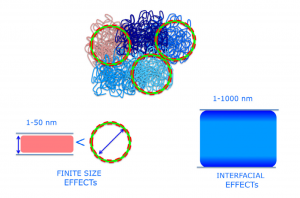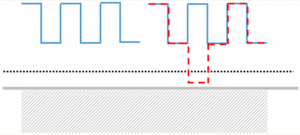Research
Our High-end objective is defining a new physical picture for structure and dynamics in confinement, permitting to predict and tailor the behavior of soft materials in nanometric geometries. In the following paragraphs we briefly introduce the main research themes of our laboratory.
Dynamics in confinement
 Confined at the nanoscale level, soft matter reveals a fascinating behavior, strongly deviating from what observed in macroscopic samples. Shifts in phase transition temperatures by almost 100 K, impressive increases in elastic moduli, tremendously longer lifetimes of amorphous compounds – those are just a few examples of the confinement effects which, since more than 20 years have been fascinating a broad community of researchers.
Confined at the nanoscale level, soft matter reveals a fascinating behavior, strongly deviating from what observed in macroscopic samples. Shifts in phase transition temperatures by almost 100 K, impressive increases in elastic moduli, tremendously longer lifetimes of amorphous compounds – those are just a few examples of the confinement effects which, since more than 20 years have been fascinating a broad community of researchers.
The classical view on the deviation from bulk behavior focuses on the balance of finite size effects and interfacial interactions in systems at thermodynamic equilibrium. For example, thin films (thickness typically below 100 nm) are treated as slabs where the bulk molecular dynamics is locally perturbed by the presence of free surfaces (~ 2 nm layer at the interface with air, other gases or vacuum) and adsorbing interfaces (proximity of non-repulsive wall). A reduction in the glass transition temperature is commonly imputed to the faster dynamics of free surfaces, while the presence of an adsorbing interface is considered as a source of slower molecular modes.
Such a picture, although very intuitive, cannot describe the peculiar features of soft matter under confinement, including exotic phenomena like the increase in glass transition temperature, Tg, at the free surface of star-shaped polymers and the reduction in Tg of capped films (no free surfaces), in several nanocomposites and in adsorbed layers. It is obvious that one or more key parameters are still missing in our understanding of confined systems.
Based on our recent work, we propose a new picture on the dynamics of soft matter confined in ultrathin films, focusing on nonequilibrium and on the impact of irreversible adsorption on the structural relaxation.
Physics of irreversible adsorption
 Adsorption – the increase in density in proximity of attractive interfaces – is a ubiquitous phenomenon with a tremendous impact on several mechanisms, ranging from physiological functions (interaction protein/membrane, immune response, …) to processes of industrial interest (catalysis, purification, …). In addition to this well-established evidence, recent work has shown a striking correlation between the properties of soft materials confined at the nanoscale level and the presence of a layer irreversibly adsorbed onto the host substrate (or filler, in the case of nanocomposites). In particular, it was experimentally verified that it is possible to tune transition temperatures, viscosity, crystallization rate, wettability and the hydrophobic/hydrophilic character of thin polymer layers by simple thermal annealing procedures that modify the adsorption degree. Consider a polymer melt in proximity of a solid non-repulsive wall. At thermodynamic equilibrium the interface will be covered by a number of monomers fixed by the polymer/substrate surface tension. Differently than small molecules, long chains are stabilized against desorption already when the enthalpy gain upon adsorption of one repeating unit is smaller than kBT. Because more monomers of the same molecule can adsorb at the same time, desorption of the whole chain, requiring cooperative detachment of the whole set of adsorbed segments, is unlikely on the experimental time scale of the experiment (up to months). This mechanism of adsorption is thus considered irreversible. While previous models ignored this features, our experiments and simulations allowed us to formulate a novel description of the kinetics of irreversible adsorption allowing to describe the time evolution of the adsorbed amount , from the early stages of adsorption , where the large available space allows a zero order reaction mechanism, to a regime characterized by formation of loops, which finally leads to saturation
Adsorption – the increase in density in proximity of attractive interfaces – is a ubiquitous phenomenon with a tremendous impact on several mechanisms, ranging from physiological functions (interaction protein/membrane, immune response, …) to processes of industrial interest (catalysis, purification, …). In addition to this well-established evidence, recent work has shown a striking correlation between the properties of soft materials confined at the nanoscale level and the presence of a layer irreversibly adsorbed onto the host substrate (or filler, in the case of nanocomposites). In particular, it was experimentally verified that it is possible to tune transition temperatures, viscosity, crystallization rate, wettability and the hydrophobic/hydrophilic character of thin polymer layers by simple thermal annealing procedures that modify the adsorption degree. Consider a polymer melt in proximity of a solid non-repulsive wall. At thermodynamic equilibrium the interface will be covered by a number of monomers fixed by the polymer/substrate surface tension. Differently than small molecules, long chains are stabilized against desorption already when the enthalpy gain upon adsorption of one repeating unit is smaller than kBT. Because more monomers of the same molecule can adsorb at the same time, desorption of the whole chain, requiring cooperative detachment of the whole set of adsorbed segments, is unlikely on the experimental time scale of the experiment (up to months). This mechanism of adsorption is thus considered irreversible. While previous models ignored this features, our experiments and simulations allowed us to formulate a novel description of the kinetics of irreversible adsorption allowing to describe the time evolution of the adsorbed amount , from the early stages of adsorption , where the large available space allows a zero order reaction mechanism, to a regime characterized by formation of loops, which finally leads to saturation
under construction…
